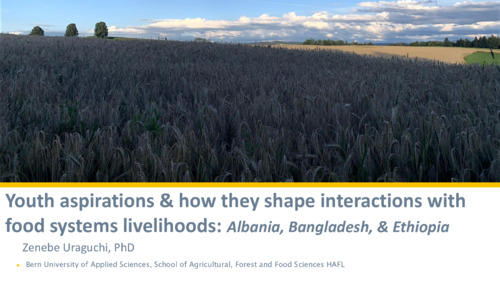Youth aspirations & how they shape interactions with food systems livelihoods: Albania, Bangladesh, and Ethiopia
Abstract
What drives the aspirations of youth in food systems? Using a systems approach, this longitudinal study critically analyzes the assumption of increased youth disengagement from food systems by taking the examples of Albania, Bangladesh, and Ethiopia— countries with a significant demographic cohort of youth. Youth interactions with food systems are uniquely shaped in the three countries by specific intersections with multiple factors including gender, wealth, health, location, and intergenerational relationships. The study highlights that barriers and choices of youth in food systems are mediated by a range of factors, such as skills development, investment/access to finance, and policy frameworks. The study is significant in three ways. First, the findings have practical implications for the design and implementation of multistakeholder initiatives that facilitate the transition of youth from education to the world of work. These initiatives in food systems tend to be prescriptive by focusing on demand-supply problems but neglecting the ecosystems around food systems where key barriers and opportunities lie. Second, it takes a holistic approach, just as with any other system or sector, to make food systems a viable source of livelihood for youth by suggesting how to design inclusive, sustainable, and scalable interventions in skills, information, and career advice; investment/access to finance; and youthspecific policy frameworks. Third, shifting food system dynamics and outcomes for improved interaction of youth with food systems requires understanding the inherent social tensions and struggles by focusing on the agency and organization that have been central and constant themes in youth empowerment.

